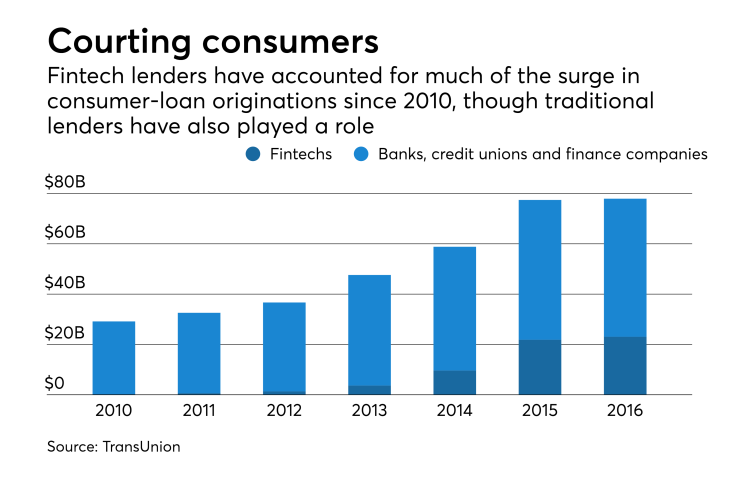Perhaps it’s time to start acknowledging that banks are no longer taking a back seat to pioneering online lending startups.
Many depositories have learned that if they fail to modernize their lending processes, they risk being left behind. At the same time, many startups have been stymied by certain intractable advantages held by the banking sector, the most notable being significantly lower funding costs.
The result is an incipient contest between fintechs and banks that until quite recently were widely dismissed as too slow to adapt.
“Banks are getting involved in a major way in financial technology,” Bill Ullman, chief commercial officer at Orchard Platform, a New York-based data analytics firm, said at an industry conference last week. “I think this convergence is really here.”
The banking industry’s newfound openness to change was perhaps the biggest takeaway from Digital Lending and Investing, a two-day conference held in New York last week. The conference, once dominated by Silicon Valley innovators, this year featured presentations from the likes of Citizens Financial and Goldman Sachs, both of which are placing big bets on digital lending.
To be sure, fintechs have gotten a considerable head start. Their share of the U.S. personal loan market grew from less than 1% in 2010 to 30% last year, according to data from TransUnion.

But internet-era companies are also starting to learn that when banks do compete online, they hold some important edges.
For one, deposit-taking banks have a significantly cheaper cost of funds than their venture capital-backed competitors. That advantage has enabled banks to lend at comparatively low interest rates while recording similar revenue margins.
Banks also have built-in customer bases, while online lenders often have to pay sky-high prices to acquire their borrowers. Ironically, many of these internet-era companies still rely on the old-fashioned direct mail to sign up customers.
“We’ve seen some companies fail,” noted Brendan Ross, CEO of Direct Lending Investments. “In the long run, you’re either going to have a huge brand, and that’s going to be the reason people open those pieces of mail, or you’re going to be consolidated away.”
Some online lenders tout their loan underwriting methods as a competitive advantage in a crowded market, but speakers at the conference were generally dismissive of those claims.
“It’s very hard to differentiate between one online lender and another,” said Brendan Dickinson, a venture capitalist at Canaan Partners. “It’s not really possible to differentiate on underwriting.”
Meanwhile, certain banks are discovering that building the technology platforms needed to run a digital lending business is not as hard as it may have appeared.
“We built a full digital bank from the ground up in less than a year,” said Boe Hartman, chief information officer at Goldman’s nascent retail banking operation.
Speakers at the conference predicted that some online lenders will fail, others will get acquired, and a relatively small number will emerge as strong competitors to banks that have kept pace with change.
Indeed, some banks are already benefiting from the struggles of startups. Goldman
Admittedly, not all banks share the advantages that Goldman enjoys, including the ability to pay top dollar for engineering talent. And while banks may be able to build their own digital lending platforms, many of them will have difficulty matching the customer experience built by leading startups.
These are reasons some banks have decided to partner with digital lenders. During last week’s conference, Providence, R.I.-based Citizens announced that it has started making online small-business loans in partnership with New York-based Fundation Group.
“We’re a huge believe in the power of fintechs as partners,” said Brad Conner, vice chairman of the consumer banking division at Citizens.
Still, these partnerships between banks and online lenders have been slow to materialize, at least in big numbers. In some cases, the key hurdle may be the regulatory obligations that banks when they enter into deals with third parties.
“Yes, partnerships are happening, but probably not at the pace that some people expected,” said Fundation CEO Sam Graziano.
John Wirth, vice president of fintech strategy at TransUnion, compared the rise of online lenders between 2012 and 2015 to the emergence of dot-coms in 1990s. He noted that Amazon and eBay eventually emerged as industry leaders, while a slew of other e-commerce companies closed their doors.
But by the mid-2000s, traditional retailers that did not have websites were no longer taken seriously. “Over time, more traditional lenders will be adopting fintech capabilities,” Wirth said in an interview before the conference.
Or as Karen Mills, a former head of the U.S. Small Business Administration, said: “Don’t count out the dinosaurs yet.”





